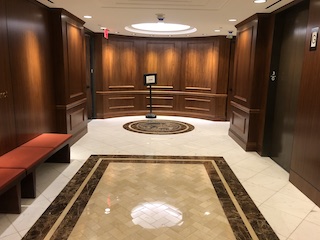The People then appealed the rulings to the appellate division of the superior court, which upheld the rulings on the motion to suppress. It explained that although the People were not required to file written oppositions, the People could not meet its burden of proof when it filed no opposition and no appearance was made. The appellate division also stated that the People could not expect the judge to “ferret out information to justify the search” by both cross-examining the ABC employees and be an impartial decision maker.
The People then appealed the appellate division’s ruling to the Fourth Appellate District Court of Appeal in San Diego, which reversed in the People’s favor.
 Fourth Appellate District Court of Appeal Div 1 San Diego
Fourth Appellate District Court of Appeal Div 1 San Diego
The appellate court distilled down the issue it had to decide to, since the trial court judge never considered the merits of the motion, whether a superior court in every infraction case grant a motion to suppress when the prosecution does not respond in writing or appear at the suppression hearing.
In other words, once defendant makes a prima facie case that the officer conducted a search without a warrant, the burden lies squarely on the prosecution to provide justification for the warrantless search. People v. Johnson (2006) 38 Cal.4th 717, 723 (prosecution cannot meet its burden of justifying a warrantless search or seizure by presenting affidavits of investigating officers in lieu of their live testimony).
However, the Fourth Appellate District held that in an ordinary infraction case, the prosecution is not required to oppose a motion to suppress by filing an opposition brief or appearing at the suppression hearing. Instead, it may meet its burden to provide justification for a warrantless search by subpoenaing relevant law enforcement witnesses, who may in turn provide narrative testimony to the court in the same manner as would be permitted in the prosecution absence at an infraction trial.
So long as the court’s conduct in calling and questioning the witnesses is fair and properly limited in scope, such a procedure provides a fair hearing, does not lessen the prosecution’s burden of proof and comports with the flexible procedures allowed in infraction trials under People v. Carlucci (1979) 23 Cal.3d 249 and People ex rel. Kottmeier v. Municipal Court (1990) 220 Cal.App.3d 602.
In Carlucci, the California Supreme Court commented that, in an infraction matter, “the trial court should exercise great caution in the examination of witnesses, lest by the nature or form of the questions asked he throw the weight of his influence to the one side or the other.” Carlucci, at 258.
The Carlucci court explained why a more flexible approach was justified for infraction cases: “it is in the interest of the defendant, law enforcement, the courts and the public to provide simplified and expeditious procedures for the adjudication of less serious traffic offenses.” Carlucci, at 257.
Since the judge concluded the prosecution’s nonappearance in and of itself compelled suppression, the suppression ruling was reversed and the case was remanded for a new hearing on the motion to suppress.
We certainly do not like this ruling, as this ticket for these two females was a big deal and the prosecution was able to take a very casual approach when the defendants took this case seriously. We do not think this is fair to the defendants. We hope the judge, on remand, granted the motions again, but after hearing from the officers insufficient articulable facts to justify a detention.
The citation for the Fourth Appellate District Court ruling discussed above is People v. Superior Court of San Diego (Lula Sophia Gong Cotsirilos and Tess Elisabet Edman)(4th App. Dist., 2020) 50 Cal. App. 5th 1023, 264 Cal. Rptr. 3d 589.
For more information about motions to suppress, please click on the following articles:
 Fourth Appellate District Court of Appeal Div 1 San Diego
Fourth Appellate District Court of Appeal Div 1 San Diego